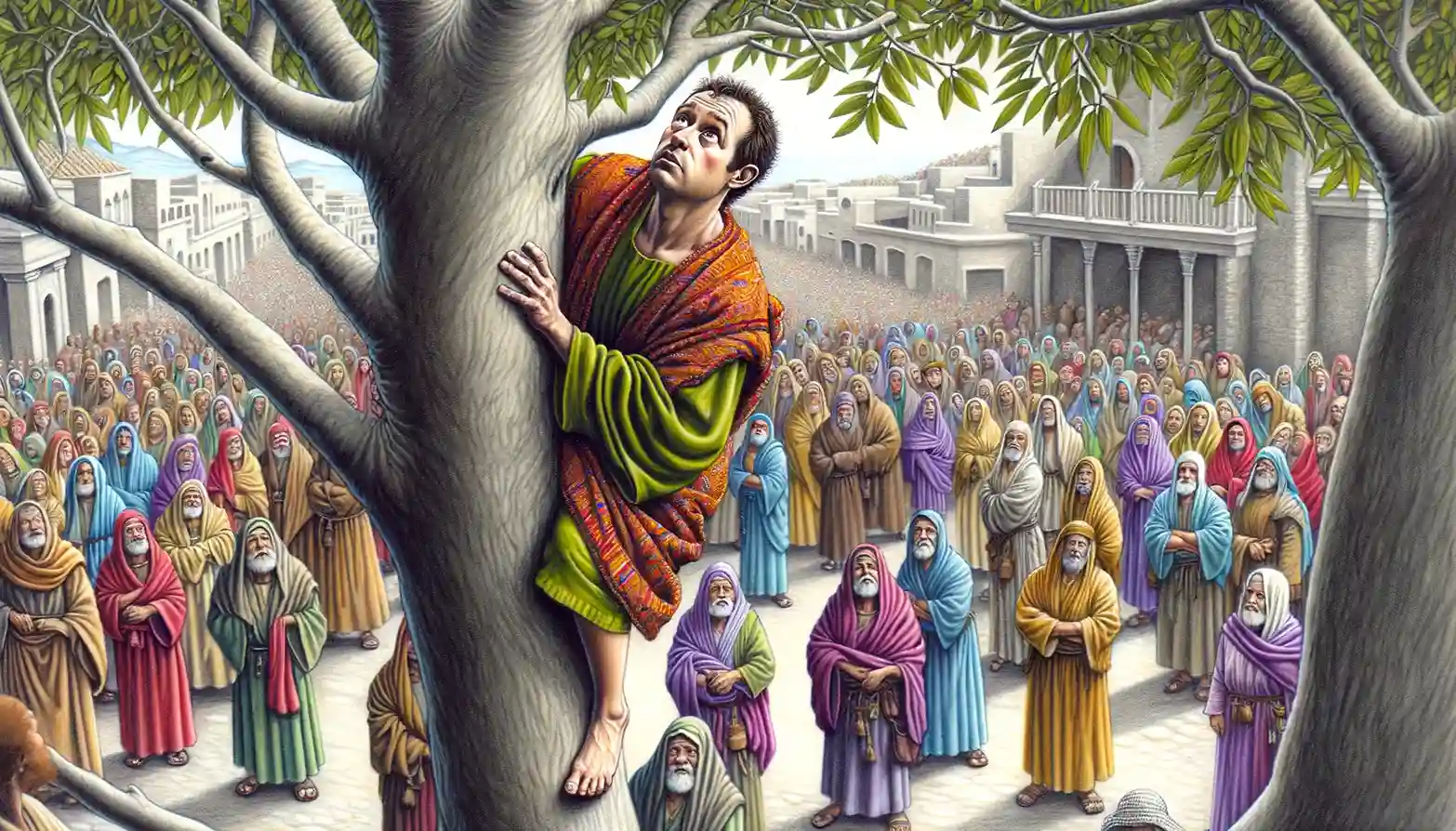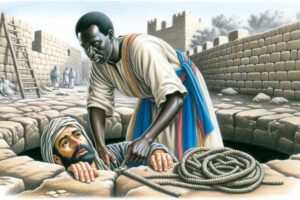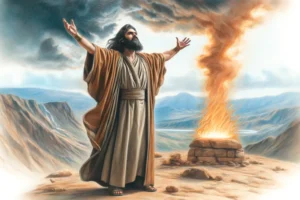
Zacchaeus: Tax collector in Jericho who climbed a tree to see Jesus
- Categories Bible Characters
- Comments 0 comment
Zacchaeus is a memorable figure from the New Testament, particularly from the Gospel of Luke. Here are some quick facts about him:
- Tax Collector: Zacchaeus was a chief tax collector in Jericho, a position that made him wealthy but also generally despised as tax collectors were often viewed as traitors and extortionists (Luke 19:2).
- Short in Stature: His physical shortness is specifically mentioned, which played a key role in why he climbed a tree to see Jesus, as he could not see over the crowd (Luke 19:3).
- Sycamore Tree: To catch a glimpse of Jesus as he passed by, Zacchaeus climbed a sycamore tree, highlighting his eagerness to overcome obstacles to see Jesus (Luke 19:4).
- Personal Encounter with Jesus: Jesus noticed Zacchaeus in the tree and called him by name, instructing him to come down as He intended to visit his home. This direct interaction is a significant moment in Zacchaeus’ story (Luke 19:5).
- Transformation: Zacchaeus’ encounter with Jesus led to a profound personal transformation. He promised to give half of his possessions to the poor and to repay fourfold anyone he had cheated (Luke 19:8).
- Salvation: Jesus declared that salvation had come to Zacchaeus’ house, affirming his faith and his acceptance despite his social standing as a tax collector (Luke 19:9).
- Example of Grace: Zacchaeus’ story is often cited as an example of Jesus’ mission to seek and save the lost, demonstrating grace and transformation available to all, regardless of past actions or social status (Luke 19:10).
“But Zacchaeus stood up and said to the Lord, ‘Look, Lord! Here and now I give half of my possessions to the poor, and if I have cheated anybody out of anything, I will pay back four times the amount.'”
Luke 19:8
The story of Zacchaeus, as recounted in Luke 19:1-10, provides a vivid illustration of Jesus’ transformative impact on individuals and underscores several theological and social themes central to the Gospel message. Zacchaeus, a chief tax collector in Jericho, becomes a symbol of redemption and the inclusive nature of Jesus’ ministry.
Contextual Background
Zacchaeus was a tax collector, a role particularly despised in Jewish society as tax collectors were seen as collaborators with the Roman occupiers. Moreover, they were often accused of extortion to enrich themselves. Zacchaeus, being a chief tax collector, would have been particularly wealthy and, by extension, particularly maligned.
Physical and Symbolic Stature
The narrative begins with a mention of Zacchaeus’ short stature, which serves as both a physical and symbolic detail. His physical inability to see over the crowd leads him to climb a sycamore tree, a gesture that reflects his eagerness and desperation to see Jesus. Symbolically, his short stature can be seen as representing his diminished social standing and spiritual condition due to his profession.
Encounter with Jesus
The pivotal moment in the story is Jesus’ decision to address Zacchaeus personally, calling him down from the tree and announcing His intention to stay at his house. This direct interaction is significant. It breaks several social conventions, notably the stigma associated with interacting with tax collectors, and highlights a fundamental aspect of Jesus’ ministry: reaching out to those marginalized or scorned by mainstream society.
Zacchaeus’ Response
Zacchaeus’ response to Jesus’ grace is immediate and radical. He promises to give half of his possessions to the poor and to repay fourfold anyone he had cheated. This pledge not only signifies repentance but also restitution, going beyond the requirements of the Jewish law (which required repayment plus an additional 20%, according to Leviticus 6:5). His actions demonstrate the genuine transformation of his heart and his desire to rectify past wrongs.
Theological Implications
Jesus’ declaration that “salvation has come to this house today” (Luke 19:9) following Zacchaeus’ declaration of restitution is theologically rich. It affirms that salvation is immediately available to all who earnestly seek Jesus and are ready to turn away from their sins. This statement also reaffirms Jesus’ mission “to seek and to save the lost,” emphasizing the inclusive scope of His ministry.
Social and Ethical Dimensions
Zacchaeus’ story challenges the prevailing social norms and the community’s exclusionary practices. Jesus’ acceptance of Zacchaeus despite his occupation and past behavior offers a powerful counter-narrative to the social ostracism he faced. It prompts a reevaluation of the criteria by which society judges righteousness and worthiness of divine attention.
Conclusion
Zacchaeus’ encounter with Jesus illustrates profound themes of grace, transformation, and social justice. It not only highlights Jesus’ radical inclusivity but also emphasizes the personal ethical change that accompanies genuine spiritual conversion. Zacchaeus becomes a model of how personal encounters with the divine can lead to public acts of justice and charity, reshaping one’s life and community.
You may also like

Ebed-Melech: The Courageous Rescuer

Elijah: The Prophet of Fire

